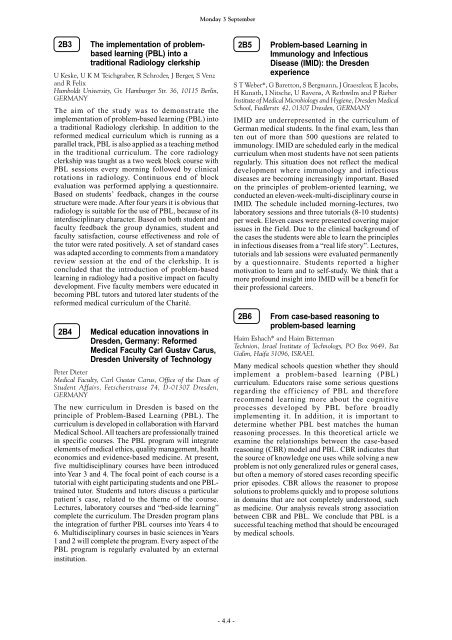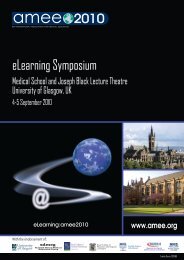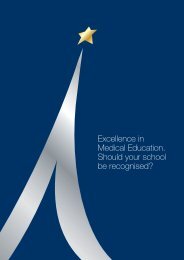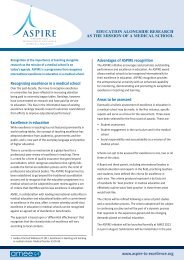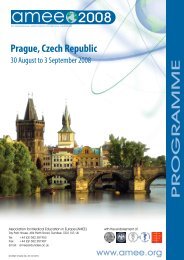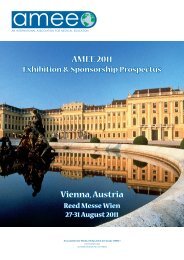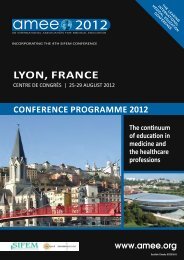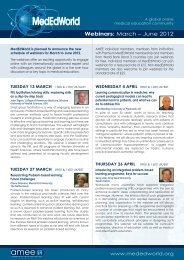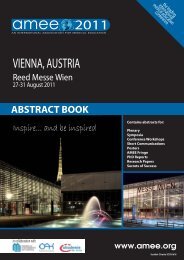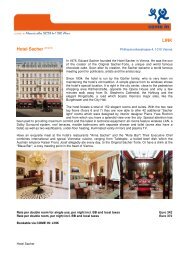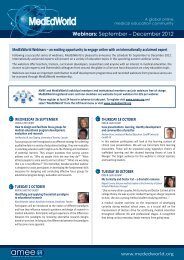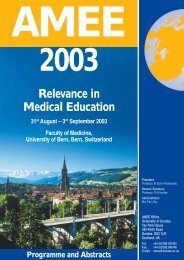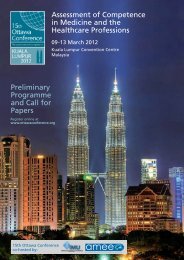AMEE Berlin 2002 Programme
AMEE Berlin 2002 Programme
AMEE Berlin 2002 Programme
You also want an ePaper? Increase the reach of your titles
YUMPU automatically turns print PDFs into web optimized ePapers that Google loves.
2B3 The implementation of problembased<br />
learning (PBL) into a<br />
traditional Radiology clerkship<br />
U Keske, U K M Teichgraber, R Schroder, J Berger, S Venz<br />
and R Felix<br />
Humboldt University, Gr. Hamburger Str. 36, 10115 <strong>Berlin</strong>,<br />
GERMANY<br />
The aim of the study was to demonstrate the<br />
implementation of problem-based learning (PBL) into<br />
a traditional Radiology clerkship. In addition to the<br />
reformed medical curriculum which is running as a<br />
parallel track, PBL is also applied as a teaching method<br />
in the traditional curriculum. The core radiology<br />
clerkship was taught as a two week block course with<br />
PBL sessions every morning followed by clinical<br />
rotations in radiology. Continuous end of block<br />
evaluation was performed applying a questionnaire.<br />
Based on students’ feedback, changes in the course<br />
structure were made. After four years it is obvious that<br />
radiology is suitable for the use of PBL, because of its<br />
interdisciplinary character. Based on both student and<br />
faculty feedback the group dynamics, student and<br />
faculty satisfaction, course effectiveness and role of<br />
the tutor were rated positively. A set of standard cases<br />
was adapted according to comments from a mandatory<br />
review session at the end of the clerkship. It is<br />
concluded that the introduction of problem-based<br />
learning in radiology had a positive impact on faculty<br />
development. Five faculty members were educated in<br />
becoming PBL tutors and tutored later students of the<br />
reformed medical curriculum of the Charité.<br />
2B4 Medical education innovations in<br />
Dresden, Germany: Reformed<br />
Medical Faculty Carl Gustav Carus,<br />
Dresden University of Technology<br />
Peter Dieter<br />
Medical Faculty, Carl Gustav Carus, Office of the Dean of<br />
Student Affairs, Fetscherstrasse 74, D-01307 Dresden,<br />
GERMANY<br />
The new curriculum in Dresden is based on the<br />
principle of Problem-Based Learning (PBL). The<br />
curriculum is developed in collaboration with Harvard<br />
Medical School. All teachers are professionally trained<br />
in specific courses. The PBL program will integrate<br />
elements of medical ethics, quality management, health<br />
economics and evidence-based medicine. At present,<br />
five multidisciplinary courses have been introduced<br />
into Year 3 and 4. The focal point of each course is a<br />
tutorial with eight participating students and one PBLtrained<br />
tutor. Students and tutors discuss a particular<br />
patient´s case, related to the theme of the course.<br />
Lectures, laboratory courses and “bed-side learning”<br />
complete the curriculum. The Dresden program plans<br />
the integration of further PBL courses into Years 4 to<br />
6. Multidisciplinary courses in basic sciences in Years<br />
1 and 2 will complete the program. Every aspect of the<br />
PBL program is regularly evaluated by an external<br />
institution.<br />
Monday 3 September<br />
- 4.4 -<br />
2B5 Problem-based Learning in<br />
Immunology and Infectious<br />
Disease (IMID): the Dresden<br />
experience<br />
S T Weber*, G Baretton, S Bergmann, J Graeszlear, E Jacobs,<br />
H Kunath, I Nitsche, U Ravens, A Rethwilm and P Rieber<br />
Institute of Medical Microbiology and Hygiene, Dresden Medical<br />
School, Fiedlerstr. 42, 01307 Dresden, GERMANY<br />
IMID are underrepresented in the curriculum of<br />
German medical students. In the final exam, less than<br />
ten out of more than 500 questions are related to<br />
immunology. IMID are scheduled early in the medical<br />
curriculum when most students have not seen patients<br />
regularly. This situation does not reflect the medical<br />
development where immunology and infectious<br />
diseases are becoming increasingly important. Based<br />
on the principles of problem-oriented learning, we<br />
conducted an eleven-week-multi-disciplinary course in<br />
IMID. The schedule included morning-lectures, two<br />
laboratory sessions and three tutorials (8-10 students)<br />
per week. Eleven cases were presented covering major<br />
issues in the field. Due to the clinical background of<br />
the cases the students were able to learn the principles<br />
in infectious diseases from a “real life story”. Lectures,<br />
tutorials and lab sessions were evaluated permanently<br />
by a questionnaire. Students reported a higher<br />
motivation to learn and to self-study. We think that a<br />
more profound insight into IMID will be a benefit for<br />
their professional careers.<br />
2B6 From case-based reasoning to<br />
problem-based learning<br />
Haim Eshach* and Haim Bitterman<br />
Technion, Israel Institute of Technology, PO Box 9649, Bat<br />
Galim, Haifa 31096, ISRAEL<br />
Many medical schools question whether they should<br />
implement a problem-based learning (PBL)<br />
curriculum. Educators raise some serious questions<br />
regarding the efficiency of PBL and therefore<br />
recommend learning more about the cognitive<br />
processes developed by PBL before broadly<br />
implementing it. In addition, it is important to<br />
determine whether PBL best matches the human<br />
reasoning processes. In this theoretical article we<br />
examine the relationships between the case-based<br />
reasoning (CBR) model and PBL. CBR indicates that<br />
the source of knowledge one uses while solving a new<br />
problem is not only generalized rules or general cases,<br />
but often a memory of stored cases recording specific<br />
prior episodes. CBR allows the reasoner to propose<br />
solutions to problems quickly and to propose solutions<br />
in domains that are not completely understood, such<br />
as medicine. Our analysis reveals strong association<br />
between CBR and PBL. We conclude that PBL is a<br />
successful teaching method that should be encouraged<br />
by medical schools.


